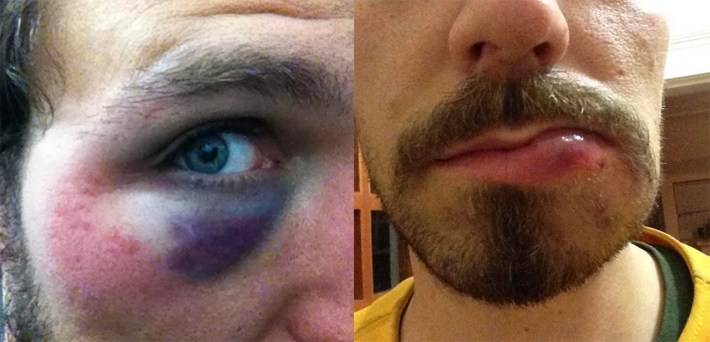Earlier this spring, rumors began circulating that Saturday afternoon summer softball was on the verge of cancellation. Word was that the fields we play on—two diamonds in McCarren Park, between the Brooklyn neighborhoods of Williamsburg and Greenpoint, that face each other and so cause quite a bit of wacky outfielder overlap—were to be torn up by the Parks Department to fix the underground pipes that’d burst over the winter.
Texts began to fly. Email threads expanded with every refresh. Notifications on the WhatsApp group chats pinged every few minutes. What will this mean for the league? Will we move to a different field? Will players leave for other leagues? Will teams disband?
If the games stopped, so too would everything that came with them: the hours spent under the afternoon sun taking swings and fielding grounders, the pre- and postgame beers that helped turn strangers into friends, and the regenerative powers of untainted leisure. Without all that, well, what was even the point of living anymore?
One of the first things I did when I moved to New York City in the summer of 2019 was ask everyone I knew about where to play softball.
By then, I’d been in leagues nearly 15 years, first in Los Angeles, then in Oakland. I’ve played with 12-inch neon green hard balls (got hit in the face twice; not fun), 12- and 14-inch plush balls that start off hard then slowly get pummeled, and even those 16-inch Clinchers, the stout Chicago-style ones you play with your bare hands. I’ve always found that, for me, rec league softball is the ideal social entryway into a new city.

By design, slow-pitch softball is a relatively casual sport, without the embedded aggro tendencies of, say, basketball or soccer. You’re not colliding with other bodies, and aside from an occasional errant throw, hard liner to the pitcher, or nasty-hop ground ball, there isn’t much in the way of danger. It’s slow-pitch. You’re supposed to take it easy and largely chill out.
Rather than the cloistered, homogenized cliques that form in many social communities, rec league softball is made up of all sorts of people, with varied careers and entirely disparate life tracks. The only guaranteed overlap in interests is “likes to play softball,” which tends to foster the same sort of relationships you might find within a group of bar regulars. You don’t know too much about each other, and somewhat because of that, you’re always happy to shoot the shit whenever you see them. It helps that the low athletic demands of the sport mean you can drink a few beers after the games. Hell, maybe even during.
When I moved east, it’d been at least a month since my last softball game in Oakland, and I had no idea how to get involved in the Brooklyn scene. I began meeting up with Twitter mutuals and writer acquaintances, and each time asking the question: “Do you know anyone who plays softball?” Soon enough, someone texted a friend who, as a matter of fact, was looking for a sub to play that weekend at McCarren. That was my in.
After that initial step, it’s usually easy enough to stick with a team so long as you are able to occasionally strike the ball with the bat, catch the ball in your mitt, and throw adequately (though that is very much third on the list). Most importantly, you have to be willing to show up and pay the league fee. Four years and a pandemic later, I’m still on that team.
The Screwballz of McCarren, the team that took me in, began over a decade ago as a group of college friends. None of them remain. Instead, the team has performed a Ship-of-Theseus routine as players’ life situations change—new job, birth of a child, moving neighborhoods, being priced out of the city—and they’re replaced with friends and friends of friends. We’ve spent long postgame afternoons trying to figure out the squad’s family tree—who was first, who’s accounted for most players, etc.—which brings us to the most important part of rec league softball: The Hang.
While lives are busy enough that not everyone can be expected to hang out after every single game, if you’re not blocking out at least an hour postgame to grab a drink (non-alcoholic is fine) and bullshit in the sun or under the stars, then you’re not really participating in rec league sports. You’re doing something else, and frankly, it’s grotesque.
I’m on another team in another sport that doesn’t hang out afterward. Not coincidentally, we've lost every game. While that’s to be expected for a “free agent team”—that is, one composed of people who don’t know each other and were just thrown together to fill out the league—that’s no excuse. A team of randos does not have to be consistent losers.
One of my best memories came with a similarly composed team in Oakland called The Independents. It was formed when one guy took the initiative to cold-email the first dozen “free agents” waiting for a team to ask, “Why don’t we just start our own?” After three seasons, during one chilly night in the Oakland hills, The Independents finally made it to the championship.
We were down four runs going into the bottom of the ninth. The first batter got on, then the second, then a three-run home run brought us within one. Then came two deflating quick outs before the woman in front of me drew a walk. Suddenly, I was at the plate with a championship on the line.
My bread-and-butter has always been going to the opposite field. I’m a right-handed batter, so this means hitting to the right side, which I’ve found works best by swinging just a bit late, trying to strike the ball when it’s already past the plate, creating an angle that “pushes” it away. For this reason, I tend to look for pitches about a foot off the plate outside. When I hit it just right, the outward spin arches the ball between the second and first baseman, then toward the foul line, where it hits fair and carries off forever into no man’s land.
In this at-bat, at the end of the championship, I got one of those perfect pitches. As soon as it left my bat, I knew it was going to be trouble.
Heading toward first I screamed, “Go! Go! Go!” to the gal in front of me, who sprinted to second and rounded to third. I caught up to her a little past third after blowing past the base coach’s stop sign, knowing that either she’d get thrown out at home to end the game or I’d score right behind her to win it all. (Plus: How are you trying to stop me on a play like this?) Her foot hit home, and a second later, I stomped on it as well, just as the ball whizzed by my head.
We’d done it. We won it all. It was my first softball championship.
When I called my dad later to tell him the game story, I started to cry. I wasn’t quite sure why. There was something about retelling the play-by-play that got to me.
“You really do have to cherish these moments,” he told me. “This is what we always said when you guys were in Little League. There’s no telling who’s going to be around next year, or how you’re going to do. All you have is this season.”
Last fall, I tore my rotator cuff. It was the result of playing way too many games at shortstop (10 in seven days) at my age (41 years old). I couldn’t lift my throwing arm over my head.
By the time I went to the doctor, I’d regained most of my mobility, but it still hurt like hell. A few weeks later, the McCarren Screwballz made it to the playoffs, and I tried to suck it up, but we lost in the first round. I don’t remember much about the game other than my throws being off, never feeling fully confident that I could still get them across the diamond.
If you play this sport long enough, you can see when the end comes for some players. In my Los Angeles 16-inch league, there was an old guy who’d pitch because he couldn’t move anymore, his legs covered in bruises from come-backers he couldn’t bend over to get. In my 12-inch Oakland league, a slow-as-hell guy tried to pull it to third every time, hoping for a bad throw. He must’ve hit around .100. The future for all of us is deterioration, but on the field, it shows pristine.
After the Screwballz’ playoff turf-out, I had a winter offseason to rehab my arm, and added an ibuprofen and 20-minute warm-up routine before games. Gone are the days when my rubber arm could play catch for hours. It’s beginning to feel like there are only so many hard, accurate throws left in there. The end of my softball career will come one day.
But not just yet.
Following much hubbub, the NYC Parks Department decided to push the busted pipe fix to this winter. So a few Saturdays ago, after a full summer season at McCarren, the Screwballz waltzed into the playoffs as a No. 1 seed.
We dispatched our first-round opponent before facing off against the league’s second seed in the championship. The final ball towered into the air, and even struck a few leaves from an in-play tree, before landing in the glove of our left fielder. When it did, we all threw up our mitts, gathered around the mound to dance and cheer, then shook the other team’s hands before jumping around some more.
We spent the rest of the afternoon in the park, sticky with dried champagne and tipsy from dozens of beers and passed-around joints and vapes, retelling the game’s big plays.
Susie’s catch behind home. Chris’s dart of a throw from right. Phebe’s outfield snag. Veronica’s tomahawk swing. Erin’s smash over short. Timmy’s massive home run. AJ’s massive, massive home run. Andrew’s clutch hit. Kate’s pre-game speech. Junior’s three-outs-by-himself inning at pitcher. Lorie’s snags at second. Mikey Four Bags’s late-game heroics with a homer of his own, finally justifying his self-assigned nickname. Tyler’s final catch. Even the “bad” call at home plate in the fifth that fired everyone up, and maybe why it wasn’t such a bad call after all.
On and on the celebration went, seemingly forever, well into the next league’s games as the sun cast down and began to paint the sky purple.
At some point, McCarren Park’s inevitable construction came up again. It was a needed fix and couldn’t be put off much longer. If the ground freezes up this winter, well, word is they may have to do it all next spring instead, putting the summer season at risk. And if that happens, what will become of the league? How will we spend all these Saturday afternoons? How many seasons together do we even have left?
All we have is this one.






